Foreign community pushes initiatives for Ho Chi Minh City's green development
The 100 CEO Tea Connect event is a part of the Ho Chi Minh City Economic Forum, which is running from September 13 to 16 with the theme of Green Growth - The Journey to Zero Emissions.
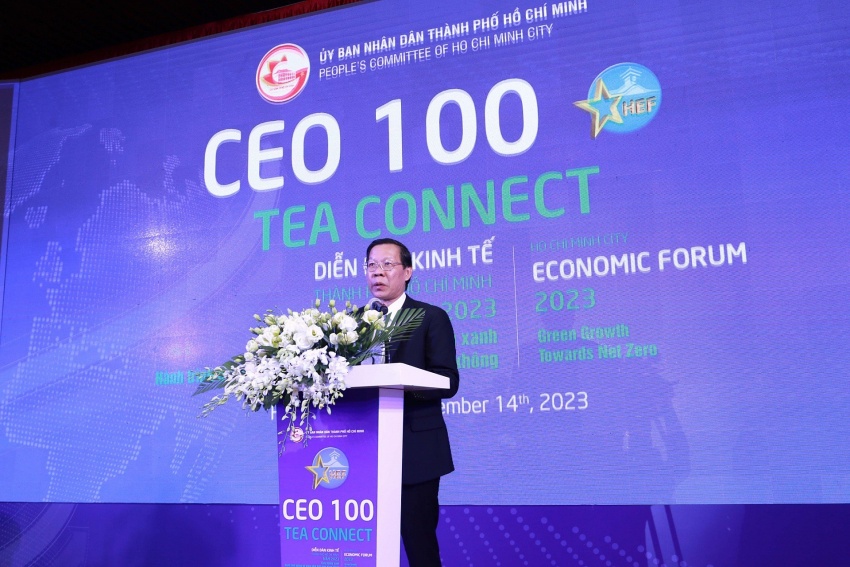 |
| Chairman of Ho Chi Minh City People's Committee Phan Van Mai speaking at the event |
It is also an opportunity for city leaders to meet and discuss with their counterparts from both domestic and foreign corporations and businesses about a number of orientations and cooperation opportunities to make Ho Chi Minh City a pioneering locality for sustainable development, green growth, and the circular economy.
According to Gabor Fluit, chairman of EuroCham, the European Union's green agreements and the Carbon Border Adjustment Mechanism aim to meet the net-zero goal by 2050. "EuroCham wishes to support Ho Chi Minh City through technology transfer, model sharing, and building capacity for projects, thereby helping the city become an export centre for the EU market. Over the next few months, we will hold a series of activities to help businesses implement Europe's green agreements and promote sustainable development," Fluit said.
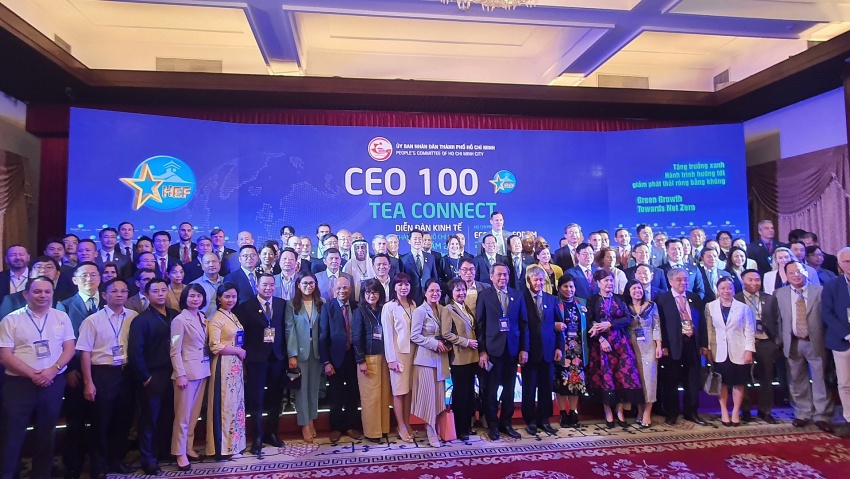 |
| At CEO 100 Tea Connect, international experts shared their experiences and pledged to join Ho Chi Minh City in implementing its green growth strategy. Photo: Le Toan |
Ichisaka Hirofumi, senior executive director of International Relations in Osaka City (Japan), shared that since 1886, Japan has had the idea of integrating environmental protection content into the legal system in an effort to control pollution.
"In the 50s, Japan developed miraculously, but it also brought with it serious pollution problems," Hirofumi stated.
In 1973, Osaka implemented the first business management model in Japan, with clear regulations on environmental factors. Thanks to that, we maintained stable growth and, at the same time, pioneered to overcome the environmental problems,” said Hirofumi.
“The more significant the growth, the more negative impacts it has on the environment, and Japan's experience is that it is necessary to have a balanced economy. In this circular economy, the output products are input materials for other manufacturing industries, regenerating and exploiting the majority of products,” he emphasised.
Meanwhile, Ricardo Valente, city councillor for economics and finance from Porto City (Portugal), emphasised that there are many factors that need to be achieved if Ho Chi Minh City wants to develop in even greener ways.
The first is education. In Porto, right from the first school year, students are taught how to adapt to greening and green growth.
The second factor is the need to create a circular business spirit. Challenges must be set for businesses to meet the city's requirements, especially startup businesses.
He said, “Any business with an effective solution will be chosen by both city authorities and consumers. The question must be, how can everyday items, such as clothes and electronic devices, be reused to avoid waste and harm to the environment?”
Other solutions include fiscal policies and tax exemption incentive mechanisms. Porto city has set up environmental indices and tax exemptions for companies that meet them. It also has an energy centre that provides energy and guides people to build green houses that meet environmental safety criteria.
Another vital point is that local governments are the largest consumers in society, so they must pioneer the use of green products, creating incentives for businesses to produce them.
"If the state does not participate in this green consumption process, it cannot create motivation for society," he emphasised.
| “The city has always made great efforts in a bid to build a convenient, safe, and effective working environment for both people and businesses,” said Mai |
Chairman of Ho Chi Minh City People's Committee Phan Van Mai said that the comments made at CEO 100 Tea Connect will be absorbed by the city in the completion of its green development strategic framework until 2030, with a vision to 2050, in September.
Ho Chi Minh City's green development framework for 2030, with a vision to 2050, puts people and businesses at the centre of the transition, focusing on green human resources, infrastructure, and behaviour. Pilot projects such as turning Can Gio district into the first green locality highlight the pioneering nature of this green transformation.
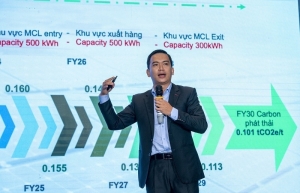 | Green development: A solution to post-pandemic recovery for businesses At the 2022 Green Economy Forum – with the theme of Post-pandemic Adaptation and Development – in Ho Chi Minh City, all speakers agreed that Green Development is a solution that will coincide with future trends, helping businesses navigate their way out of the pandemic. |
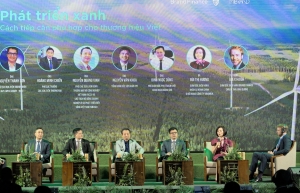 | Green development adds value to Vietnamese brands A seminar, organised by Brand Finance and Mibrand Vietnam, on how Vietnamese brands should approach the transition towards sustainable development took place as part of the announcement ceremony of the 2023 Top 100 brands in Vietnam on August 16. |
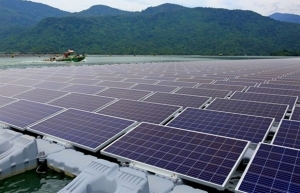 | Vietnam to introduce criteria for national green development Vietnam is soon to introduce a new set of national criteria aimed specifically at speeding the development of green industries in line with international standards, according to the Ministry of Planning and Investment (MPI). |
What the stars mean:
★ Poor ★ ★ Promising ★★★ Good ★★★★ Very good ★★★★★ Exceptional
Related Contents
Latest News
More News
- $100 million initiative launched to protect forests and boost rural incomes (January 30, 2026 | 15:18)
- Trung Nam-Sideros River consortium wins bid for LNG venture (January 30, 2026 | 11:16)
- Vietnam moves towards market-based fuel management with E10 rollout (January 30, 2026 | 11:10)
- Envision Energy, REE Group partner on 128MW wind projects (January 30, 2026 | 10:58)
- Vingroup consults on carbon credits for electric vehicle charging network (January 28, 2026 | 11:04)
- Bac Ai Pumped Storage Hydropower Plant to enter peak construction phase (January 27, 2026 | 08:00)
- ASEAN could scale up sustainable aviation fuel by 2050 (January 24, 2026 | 10:19)
- 64,000 hectares of sea allocated for offshore wind surveys (January 22, 2026 | 20:23)
- EVN secures financing for Quang Trach II LNG power plant (January 17, 2026 | 15:55)
- PC1 teams up with DENZAI on regional wind projects (January 16, 2026 | 21:18)

 Tag:
Tag:




















 Mobile Version
Mobile Version